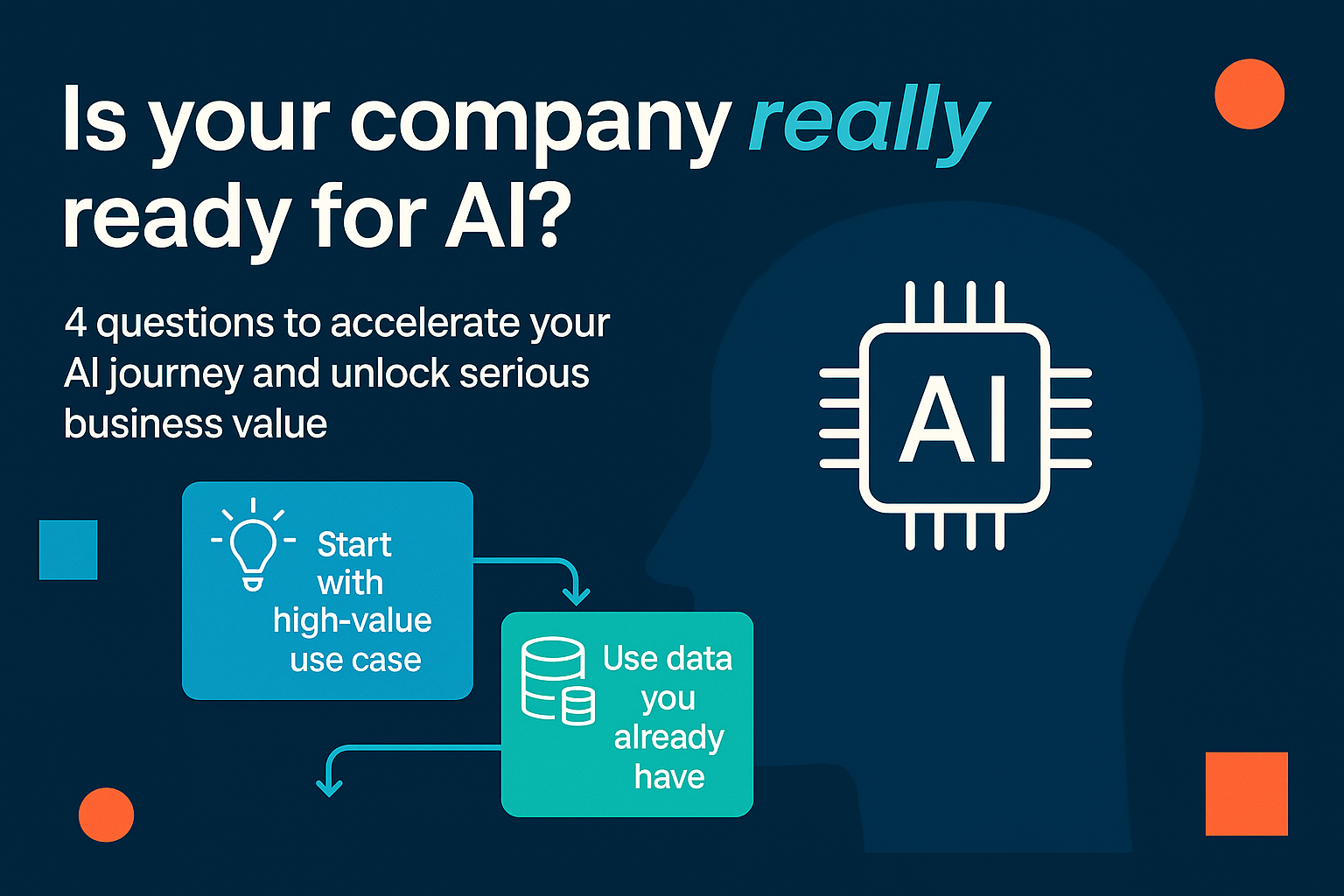4 questions to accelerate your AI journey and unlock serious business value
AI has gone from optional to operational. It's not a question of if your company will use it—it's how well you'll do it.
But let's be honest: many companies rush in with high hopes, only to stall or backtrack. Not because AI doesn't work, but because they skipped the groundwork.
The good news?
With the right preparation, AI can dramatically boost productivity, improve decision-making, and unlock real competitive advantage.
We've seen it firsthand—AI succeeds fastest in companies that align their goals, data, and people from the start.
The lesson?
Don't delay your AI journey—prepare it.
Why readiness amplifies results
When AI lands in a well-prepared environment, its impact is exponential. We've seen teams:
- Cut manual tasks by 50%
- Reduce response times by 80%
- Free up strategic capacity within weeks
But AI doesn't work in isolation. It connects to your processes, data, and people.
That's why a few key readiness questions can dramatically increase your odds of success—and speed up time to value.
4 strategic questions to ask before launching AI
1. Do we have a high-value use case to start with?
Start small—but start smart.
AI thrives when it solves a specific, painful problem. In our work, this often looks like:
- Automating repetitive tasks in customer service
- Speeding up lead qualification for sales
- Handling appointment logistics in healthcare
- Analyzing open-text feedback in HR
A good use case:
- Has measurable cost or time impact
- Is repeatable and scalable
- Has data available (even if messy—it can be cleaned)
Don't aim for perfection. Aim for clear value.
2. Is our data good enough to get started?
You don't need perfect data—you need usable data.
In one recent case, we launched a feedback summarization bot using 3 years of raw CSV exports. It wasn't clean or structured—but it was enough to create real-time dashboards that transformed operations.
If you can:
- Locate the data
- Access it reliably
- Understand what it represents
...you can start.
AI pilots are a great excuse to clean things up along the way.
3. Who's leading—and do they have support?
The best AI rollouts have both bottom-up buy-in and top-down sponsorship.
We've seen IT build amazing tools no one used. We've seen execs love the idea but never fund it.
You need:
- A business owner with real pain to solve
- A technical lead who can move fast
- An executive sponsor who clears blockers
If you can't name these people, your project will likely stall.
But when they're aligned? You can move very, very fast.
4. What does success look like—and how will we track it?
Don't overthink this.
Define success in business terms, not technical ones:
- Time saved per user per week
- Reduced error rates
- Faster turnaround times
- Higher conversion or satisfaction scores
Even better, set a timebox:
*In 3 months, we want X to improve by Y.*
This creates momentum—and helps you communicate results early.
The same automation that saves 5 hours today can free entire workflows tomorrow.
Final thought: AI rewards the prepared
AI is not a distant future—it's already here.
Success doesn't go to those who move first—it goes to those most ready to adapt.
If you take a few weeks to clarify your use case, align your team, and prep your data, your AI rollout won't just succeed—it'll compound.
We've seen it. We've built it. And we're helping others do the same.
If you want to avoid wasting time and resources on unproven ideas, check out Avoiding Costly AI Prototypes for practical methods to validate your AI concepts quickly.
If this sparked ideas—or questions—let's talk. I'm always curious how teams are approaching their own AI journey.
